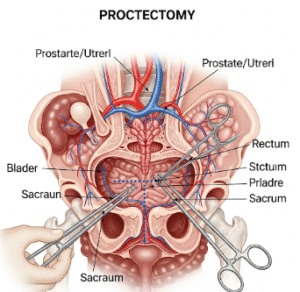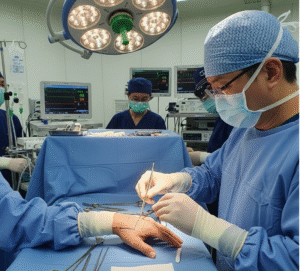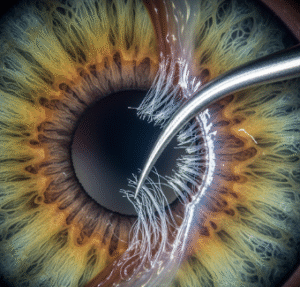Overview
Bruxism is a condition characterized by repetitive clenching, grinding, or gnashing of the teeth, often occurring unconsciously during sleep (sleep bruxism) or while awake (awake bruxism). It can lead to tooth damage, jaw pain, headaches, and temporomandibular joint (TMJ) disorders.
In Korea, bruxism is commonly managed in dental clinics, oral and maxillofacial centers, and sleep medicine facilities, emphasizing early detection, symptom relief, and prevention of long-term dental and jaw complications. Korean dentists utilize custom dental appliances, behavioral therapy, and advanced diagnostics to treat bruxism effectively.
What is Bruxism?
Bruxism is a movement disorder of the jaw that often occurs involuntarily. It can be classified into:
- Sleep bruxism: Grinding or clenching during sleep, often associated with sleep disturbances or stress
- Awake bruxism: Conscious or semi-conscious clenching during daytime, often linked to stress, anxiety, or concentration
Chronic bruxism can cause tooth wear, enamel erosion, gum recession, and TMJ dysfunction, affecting overall oral health and quality of life.
Symptoms
Symptoms of bruxism may include:
- Grinding or clenching of teeth, often reported by a bed partner
- Jaw pain, stiffness, or soreness, especially in the morning
- Headaches, particularly tension-type headaches originating from jaw muscles
- Tooth sensitivity due to enamel wear
- Fractured, chipped, or worn-down teeth
- Ear pain or a feeling of fullness in the ears
- Difficulty opening or closing the mouth comfortably
- Sleep disturbances, including restless sleep or insomnia
Symptoms vary depending on the severity, duration, and whether bruxism occurs during sleep or wakefulness.
Causes
Bruxism can result from a combination of behavioral, psychological, and physical factors:
- Stress and anxiety, which increase jaw muscle activity
- Sleep disorders, such as obstructive sleep apnea
- Malocclusion (misaligned teeth) or abnormal bite
- Lifestyle factors, including excessive caffeine or alcohol consumption
- Neurological disorders, such as Parkinson’s disease or Huntington’s disease
- Medications, particularly certain antidepressants or antipsychotics
- Genetic predisposition, as bruxism can run in families
Risk Factors
- High stress or anxiety levels
- Poor sleep quality or sleep disorders
- Caffeine, alcohol, or tobacco use
- Age, particularly in children and young adults, though it can occur at any age
- Personality traits, such as hyperactivity or competitiveness
- Dental misalignment or orthodontic issues
- Use of certain medications affecting the central nervous system
Complications
Chronic bruxism can lead to several complications affecting oral health and overall well-being:
- Tooth wear and enamel erosion, potentially requiring dental restoration
- Fractured or chipped teeth
- Temporomandibular joint (TMJ) disorders, causing jaw pain and limited movement
- Headaches and facial pain, affecting daily activities
- Sleep disruption, which can lead to fatigue and irritability
- Gum recession and increased tooth sensitivity
- Psychological stress due to persistent pain or cosmetic concerns
Prevention
Preventive strategies aim to reduce teeth grinding and protect oral structures:
- Stress management techniques, such as meditation, yoga, or therapy
- Avoiding excessive caffeine, alcohol, and stimulants
- Maintaining good sleep hygiene to improve sleep quality
- Regular dental check-ups to detect early signs of wear or misalignment
- Use of protective devices, such as night guards or splints, to prevent tooth damage
- Behavioral strategies, like jaw relaxation exercises and avoiding clenching during the day
- Orthodontic correction for misaligned teeth when indicated
Treatment Options in Korea
Diagnosis
Diagnosis of bruxism involves clinical evaluation, patient history, and sometimes sleep studies:
- Dental examination to assess tooth wear, fractures, and enamel erosion
- Jaw muscle palpation to detect tenderness or hypertrophy
- Patient history, including awareness of clenching or grinding and related symptoms
- Polysomnography (sleep study) in severe sleep bruxism cases
- Imaging, such as X-rays or MRI, to evaluate TMJ structure and joint health
Medical and Dental Management
Treatment focuses on symptom relief, prevention of complications, and addressing underlying causes:
- Occlusal splints or night guards to protect teeth and reduce jaw strain
- Physical therapy and jaw exercises to relieve muscle tension
- Medications, such as muscle relaxants or pain relievers for severe symptoms
- Botulinum toxin (Botox) injections in selected cases to reduce jaw muscle overactivity
- Management of underlying sleep disorders, such as obstructive sleep apnea
Behavioral and Lifestyle Interventions
- Stress reduction techniques to decrease daytime clenching
- Biofeedback therapy to increase awareness and control of jaw movements
- Sleep hygiene practices, including consistent sleep schedules and relaxing bedtime routines
- Avoiding chewing hard foods or habits like chewing gum that exacerbate jaw tension
Prognosis
The prognosis of bruxism is generally favorable with early intervention and proper management:
- Mild cases often resolve spontaneously, particularly in children
- Chronic bruxism can be managed effectively with dental appliances, behavioral therapy, and stress management
- Long-term monitoring ensures prevention of severe tooth damage or TMJ disorders
- Korean dental clinics and sleep centers provide comprehensive care, including custom night guards, physical therapy, and lifestyle counseling, leading to improved oral health, reduced pain, and better quality of life
With early recognition, multidisciplinary management, and preventive measures, bruxism in Korea is effectively controlled, allowing patients to maintain dental integrity, reduce discomfort, and improve sleep and overall well-being.













